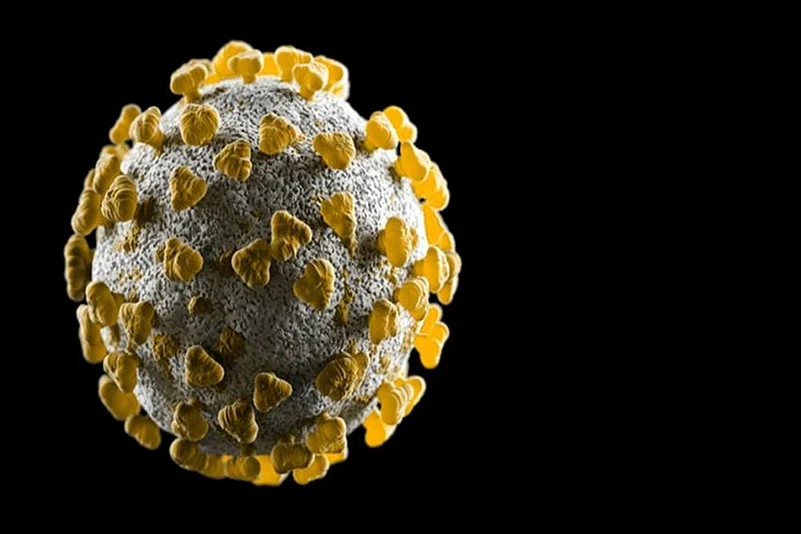Mucormycosis is a serious but previously rare fungal infection caused by a group of fungi called mucormycetes. These are ubiquitous in the environment and can often be seen on rotting food. Despite being common in the environment, it doesn’t cause infection in humans as our immune cells can easily fight such pathogens. However, when the body’s defences have been weakened, most commonly due to poorly controlled diabetes, the fungus gets a chance to infect with devastating results.
Mucormycosis is a deadly fungal infection found in some Covid-19 patients with uncontrolled diabetes and prolonged intensive care unit (ICU) stay. The infection which is also known as 'Black Fungus' affects the brain and the lungs.
Advertisement
How does the infection start and progress?
The spores of a fungus (seeds of fungus) are ubiquitous in the air and get an entry into the body through inhaled air. Usually, the infection starts from sinuses (air pockets around nose beneath cheekbone and forehead). The symptoms during this stage may be fever, facial pain, headache, stuffy nose, dental pain, bloody nasal discharge, facial swelling, or discolouration. If untreated and sometimes despite treatment, the infection spreads into surrounding areas such as orbit (around the eye) and brain. During this stage, the symptoms may include eye swelling, pain, drooping of eyelids, and restriction of eye movements, decrease in vision, blackish discolouration on the palate (roof of the mouth) and decrease in the level of consciousness.
Advertisement
How is it diagnosed?
Diagnosis is mainly based on a clinical evaluation by an ENT surgeon. A diagnostic endoscopy with visualization of the typical blackish lesion is usually followed by a biopsy to confirm the presence of fungus. Imaging with contrast MRI (or contrast CT if MRI is not feasible) is essential to understand the extent of involvement and should be done as soon as possible.
What is the treatment?
Treatment of mucormycosis may require a team of doctors from multiple specialties including an ENT surgeon, Ophthalmologist, Neurologist, Intensivist, Endocrinologist, Microbiologist, Dental surgeon, and Maxillofacial surgeon. Since poor blood sugar control is the most important risk factor, treatment for control of blood sugars is a must. The treatment of infection itself requires a combination of medicines and surgery. Some antifungal drugs are effective in killing the virus and have to be started as soon as possible. These are given as injections under hospital admission. Unfortunately, the medicines themselves are unable to fully control the infection and have to be combined with surgical removal of infected tissue.
What kind of surgery is required?
The aim of surgery done for mucormycosis is to remove the infective tissue. This usually involves surgical debridement by an ENT surgeon. In case of eye involvement, removal of the eye, as well as its surrounding structures (Exenteration), may be required. This is a facially disfiguring surgery but may be required to save the life of the patient. In case of early involvement, local injection of the drugs directly around the eye may be able to control the disease and salvage the eye.
What is the relevance of Mucormycosis to Covid-19?
Mucormycosis has been a relatively rare disease till the onset of the Covid-19 pandemic. Poorly controlled diabetes has been the most common precipitating factor. The COVID19 pandemic has caused a sudden and significant jump in the incidence of this life-threatening and disfiguring disease. Most doctors have been seeing cases almost 20 times their usual frequency during each wave of Covid. According to the reports, at least eight people out of 200 such Covid-19 survivors have died due to mucormycosis in Maharashtra, and 100 cases were notified in Gujarat. The most important reason for this sudden spurt in cases has been the poor blood sugar control further aggravated by the use of steroids during treatment for Covid. Steroids reduce reduces the body’s immunity and also cause a significant jump in blood sugar levels. Some other factors specific to Covid infection have been hypothesized but are yet unproven and under investigation.
Advertisement
How can one prevent it?
Good blood sugar control is a must for all diabetic patients. This becomes even more important with the use of steroids during the treatment of covid19. Regular blood sugar monitoring is a must for all patients using oral steroids. This is applicable even for patients who are not diabetic and should be continued even post-Covid-19 discharge. Self-prescribed and unmonitored use of steroids should be strictly avoided. These are lifesaving drugs when used judiciously but have the potential to cause various complications when used improperly. Early diagnosis and treatment can also go a long way in controlling this otherwise life-threatening condition.
Advertisement
(Dr. Sameer Kaushal is the Head- Department of Opthalmology, Artemis Hospitals)




















